Fabrizio Ulivieri's Blog, page 39
July 6, 2024
Does the good or bad fortune of the living affect the happiness or misery of the dead?
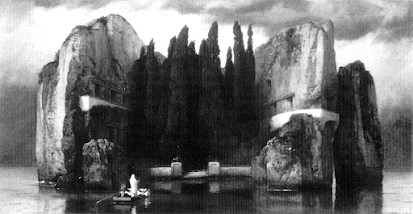
I have always maintained that the deceased live within us and that those deceased who, during their lives, came into contact with us exert a stronger influence on our lives, depending on the duration of that contact.
However, now I want to pose an opposite question: How can our current experiences, those fortunes or misfortunes that happen to us daily, influence the impact on dead people?In other words:
Does the good or bad fortune of the living affect the happiness or misery of the dead?
It is certainly difficult to find an answer because, first and foremost, one must identify the most suitable field of inquiry to guarantee a response.
To obtain an answer, I must ensure a field of investigation that can provide answers. For example, the realm of visions.
One example in this regard comes from Natuzza Evolo. One day, a deceased mother appeared to Natuzza, asking her to reassure her daughter, who was suffering greatly from her loss. Natuzza conveyed the message to the daughter, offering comfort and peace to the grieving family.
Other examples can be drawn from Anna Katharina Emmerick. Anna Katharina Emmerick recounts seeing the soul of a mother in Purgatory, who was suffering not only for her own purification but also for the difficulties her daughter was experiencing on Earth. The mother was concerned because her daughter was facing severe economic and spiritual problems. She asked Anna Katharina to pray for the daughter and to offer her spiritual support. This episode underscores the emotional and spiritual bond between the deceased and their living loved ones. Anna Katharina Emmerick also described visions in which parents' souls sought forgiveness and intercession for their children. One soul, in particular, appeared to Anna Katharina, asking her to pray that her children be freed from the consequences of her sins. The soul was tormented by the thought that her mistakes had caused misfortune and hardship for her children still living.
One of the most notable episodes involves Padre Pio seeing the soul of a deceased monk who was suffering in Purgatory. The monk appeared to Padre Pio in the confessional. He revealed that he was a monk who had died in the monastery but had not completed his penance. He was suffering in Purgatory and was deeply concerned about his family struggling on Earth due to his past actions.The deceased monk asked Padre Pio to offer prayers and Masses for him, so he could be relieved from Purgatory and, in turn, help his family find peace and resolution to their difficulties. Padre Pio agreed and devoted time to praying and offering Masses for the monk's soul. After a period of these dedicated prayers and Masses, the monk appeared to Padre Pio again, this time expressing gratitude as he was finally freed from Purgatory. The monk's release from suffering was believed to bring spiritual comfort and blessings to his family on Earth, alleviating their hardships.
Thus, yes, the good or bad fortune of the living does affect the happiness or misery of the dead.
And this contradicts what St. Augustine claims: Mortuorum animae non intersunt rebus viventium, The souls of the dead do not know what happens in the realm of the living.
-----------------------
[1] DE CURA PRO MORTUIS GERENDA LIBER UNUS, 13,15
July 4, 2024
La morte - gnostica
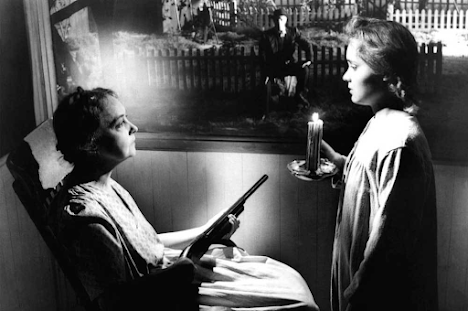
Ciò che è, fintanto che è, è già sempre ciò che ancora non è(Martin Heidegger - Essere e Tempo)
Sono già
ciò che sta
prima che sia,
all'inizio della via,
e in sé pur comprende
l' in vista di cui tende,
e vi matura
umana ogni cura
che si volve vana,
e pur viva in essa
sempre preme e allontana,se stessa.
July 2, 2024
„Gott ist nicht mehr tot. Gott lebt.“ – Antwort auf „Die fröhliche Wissenschaft“ von Friedrich Nietzsche, Fragment 125.
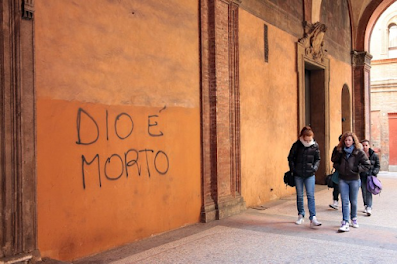
Gott ist tot. Er war tot. Gott ist auferstanden. Gott ersteht aus den Trümmern, in denen Nietzsche, Nihilismus und Existentialismus, Modernismus und Relativismus ihn zu begraben versuchten. Aber jetzt steigt Er wieder auf. Jetzt pocht und schlägt das Herz Gottes, das makellose Herz seiner Mutter. Jetzt sehen wir die Auferstehung Gottes. Jetzt ist Gott nicht mehr tot. Jetzt, wo die Kirchen wirklich leer sind und zu Gräbern Gottes geworden sind, wie Nietzsche prophezeite, jetzt, wo in Rom, im Vatikan, ein falscher Papst regiert, jetzt, wo die Welt in der Macht der Täuschung Satans lebt, jetzt, wo Gott wieder aufersteht und Er lebt wieder und wahrhaftig in den Herzen derer, die nie aufgehört haben, nach Ihm zu suchen. Er lebt in der Fähigkeit des Herzens, Gott zu finden und seine Stimme zu hören. Er lebt in der Kraft des Zuhörens derer, die Ihn suchen. Gott verbirgt sich vor der Mehrheit, offenbart sich aber den Wenigen. Gott lebt im Geringsten, aber Er lebt mit einer neuen Intensität, die selbst die meisten zu fürchten beginnen
June 29, 2024
Tu muerte de mi vida

A Silvia y ClaudiaEste dolor que no pasa
como rayo que no cesa,
del corazón tu alimento
que vive en su aliento,
y no pasa, no cesa,
y tu nombre mi herida,
come muerte de mi vida.
Y quiero encontrarte,
y besarte y hablarte,mi pasión y mi deseo,de mis dias triste apogeo.
Y este dolor no pasa,
y como rayo no cesa,tu ansiosa calentura,de mi sangre amargura.
Como fuego lo inflamas,y como viento lo derramas,y duelen, en tanta ruina,tus ojos como espina.
Tu nombre se vuelve come herida
y se hace muerte de mi vida.
June 27, 2024
Reflexiones sobre el cuerpo humano

Soy un hombre, un hombre de carne y hueso. Un hombre que nace, sufre y muere, que bebe y juega, duerme, piensa y quiere, como decía De Unamuno. Un hombre que busca siempre el espíritu, con el corazón, pero que vive en un cuerpo, que tiene sus razones y se las grita al hombre, que soy yo.
El espíritu es mi hermano. Un hermano que no siempre se entrega, pero si lo llamas, le ruegas, él viene... Pero lo rechaza el cuerpo, a veces no lo quiere porque el espíritu viola sus razones. El cuerpo tiene sus razones, que muchas veces son diferentes de las del espíritu, porque el cuerpo es mortal y el espíritu no. El espíritu es eterno.
La filosofía y la religión rara vez sitúan al cuerpo, al hombre de carne y hueso, en el centro de su pensamiento, de su núcleo. En el centro está el alma, el sujeto pensante, el cogito, el ego.
En el centro de la reflexión filosófica y religiosa, el cuerpo queda a un lado.
Sin embargo, Dios nos dio el cuerpo. Y no puede ser que todo sea malo, nuestro cuerpo. No todas sus razones pueden estar equivocadas.
Y este es el drama del ego que vive en el cuerpo, pero busca la luz del espíritu con el corazón.
Los impulsos volitivos y sexuales entran en conflicto con la pureza del espíritu y crean dolor y sufrimiento.
El hombre del que hablo no es el hombre gnóstico. Es el hombre que busca a Dios, que recorre los tortuosos senderos de la selva, buscando escuchar al espíritu para encontrar al Dios creador. El Dios que le dio el cuerpo y lo creó. El Dios que le invita a sufrir para que, en el sufrimiento, conozca sus límites y comprenda el bien y el mal y su propio ser.
June 22, 2024
Überlegungen zur Notwendigkeit, die Philosophie neu zu schreiben
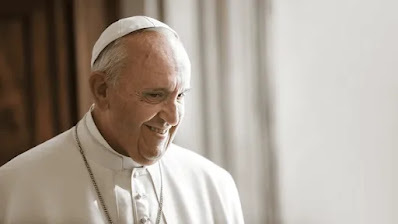
Ausgehend von Nietzsche dominierte die Idee, dass Gott tot ist, das Saeculum und nahm eine destruktive Idee für die katholische Kirche vorweg, deren Ergebnisse wir heute in Bergoglio sehen.
Die Vorstellung, dass Gott tot ist, entstand sicherlich in einem Klima, in dem die Kollaborateure des Bösen immer mehr an Boden gewonnen haben.
Die Mitarbeiter des Bösen haben die Realität des Saeculums verändert und manipuliert, und diejenigen, die darüber nachgedacht haben, haben über eine Realität nachgedacht, die von einer Macht, dem Bösen, geschaffen wurde, die ihre Funktion im Saeculum gefördert hat – zum Schaden des Geistes, der zu Gott führt.
Da wir mittlerweile so viele Beweise dafür haben, dass wir die Geschichte neu schreiben müssen, muss auch die Philosophie neu überdacht und neu geschrieben werden.
June 16, 2024
Some considerations about a sentence in Parmenides
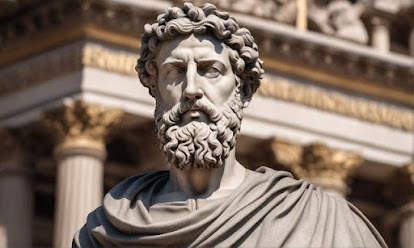
Some sentences stop your attention when you read a text. By reading Parmenides I was entangled by this sentence which made me stop reading and caught my mind.
ὡς τά δοκοῦντα [1] χρῆν δοκιμῶς εἶναι "things that appear have always been to be as they appear".
What could that χρῆν εἶναι mean? That we translated with the paraphrase "have always been".It certainly refers to something that was before the δοκίμως, "what is as it appears", which has a form because it is entrusted to, relied on the χρῆν εἶναι, which acts as prius. Therefore "what is as it appears" (δοκιμῶς) is δόξα (what is thought, supposed, imagined) because it does not possess the objective certainty of the truth, which is instead the χρῆν εἶναι "what has always been", the postulate of δόξαι but is still other than αἱ δόξαι
In the sentence"it is said that Mario is nice" the δόξα uncloses in the pronoun "they" but it is different from the prius (χρῆν εἶναι) Mario, who is "what has always been" and let unclose the δόξα "nice".
This relation, we highlighted above, reminds, mutatis mutandis, an unclosure of many centuries later. The Fichtian distinction between Objective Ego (infinite) and Subjective Ego (finite), where the Objective Ego is not identical with the subjective Ego (i.e. non-Ego). The subjective Ego is ego, the objective is Ego + non-Ego.
------------
[1] Note that the neuter participle pl. τά δοκοῦντα which we have translated as "things" properly means "appearances" and is the present participle of δοκέω, "to appear". Even δοκιμῶς is probably related to δοκέω, as well as δόξα.
Some consideration about a sentence in Parmenides

Some sentences stop your attention when you read a text. By reading Parmenides I was entangled by this sentence which made me stop reading and caught my mind.
ὡς τά δοκοῦντα χρῆν δοκίμως εἶναι "things that appear have always been to be as they appear".
What could that χρῆν εἶναι mean? That we translated with the paraphrase "have always been".It certainly refers to something that was before the δοκίμως, "what is as it appears", which has a form because it is entrusted, relied on the χρῆν εἶναι, which acts as prius. Therefore "what is as it appears" (δοκίμως) is δόξα (what is thought, supposed, imagined) because it does not possess the objective certainty of the truth, which is instead the χρῆν εἶναι "what has always been", the postulate of δόξαι but is still other than αἱ δόξαι
In the sentence"it is said that Mario is nice" the δόξα uncloses in the pronoun "they" but it is different from the prius (χρῆν εἶναι) Mario, who is "what has always been" and let unclose the δόξα "nice".
This relation, we highlighted above, reminds, mutatis mutandis, an unclosure of many centuries later. The Fichtian distinction between Objective Ego (infinite) and Subjective Ego (finite), where the Objective Ego is not identical with the subjective Ego (i.e. non-Ego). The subjective Ego is ego, the objective is Ego + non-Ego.
June 9, 2024
Consideración sobre la necesidad de reescribir la filosofía

A partir de Nietzsche, la idea de que Dios ha muerto dominó el saeculum, anticipando una idea destructiva para la Iglesia católica, cuyos resultados vemos hoy, con Bergoglio.
La idea de que Dios está muerto es ciertamente una idea que surge en un clima en el que los cooperadores del Mal han ganado cada vez más terreno.
Los cooperadores del Mal han modificado y manipulado la realidad del saeculum, y quienes han reflexionado sobre él han reflexionado sobre una realidad que fue creada por una fuerza, el Mal, que operaba para favorecer su ganancia de función en el saeculum en detrimento de el espíritu que conduce a Dios.
Como, a día de hoy, tenemos tantas evidencias de que necesitamos reescribir la Historia, en consecuencia, hay que reconsiderar la filosofía.
June 8, 2024
Claudia is contemplating a pizza in the oven

When she opened the oven to check the cooking of the pizza, a useless activity appeared to her. As useless as eating or sleeping,
“So the world boils down to nothing more than this?” Was her reaction contemplating that pizza in the oven.
It was a sudden insight. And it was this insight that led her to an overwhelming desire to die.
She had hoped for lofty ultimate goals in her life, and now, here she was, spending her life cooking pizza and washing dishes.
But was this truly the reason behind her desire to die? No, it could not. It was an explanation just a little too pat.
At this further consideration, she had a clear-cut vision.
The ultimate goal of life is death, it clearly marks the meaning of life. She mused. And that desire is like a sprint to shorten our agony. She went on.
There was a sentiment of sanctity in that desire. A postulate to a summum bonum.



